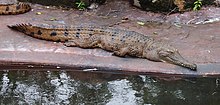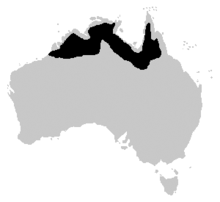Freshwater crocodile
The freshwater crocodile (Crocodylus johnstoni or Crocodylus johnsoni), is a type of crocodile that only lives in the northern regions of Australia. Freshwater crocodiles do not attack humans. But, sometimes they will bite to protect themselves or can sometimes mistake humans for food.[6]
| Freshwater crocodile Temporal range: Early Pleistocene-recent[1]
| |
|---|---|

| |
| Scientific classification | |
| Domain: | Eukaryota |
| Kingdom: | Animalia |
| Phylum: | Chordata |
| Class: | Reptilia |
| Order: | Crocodilia |
| Family: | Crocodylidae |
| Genus: | Crocodylus |
| Species: | C. johnstoni
|
| Binomial name | |
| Crocodylus johnstoni | |

| |
| Range of the freshwater crocodile in black | |
| Synonyms[4][5] | |
| |
Description
changeMales can grow as long as 2.3–3 m (7.5–9.8 ft). Females can grow as long as 2.1 m (6.9 ft). Males usually weigh about 70 kg (150 lb). Big ones can weigh about 100 kg (220 lb) or more. Females can weigh about 40 kg (88 lb). Freshwater crocodiles are very shy animals. Along with a slender snout, their teeth are smaller than the dangerous saltwater crocodile.
Distribution
changeFreshwater crocodiles live in the states of Western Australia, Queensland, and the Northern Territory. Freshwater crocodiles live in many habitats in Australia. They include: freshwater wetlands, billabongs, rivers and creeks. Freshwater crocodiles can live in places where saltwater crocodiles can not.[7]
References
change- ↑ "Crocodylus johnsoni Krefft 1873 (crocodile)". PBDB.
- ↑ Crocodile Specialist Group (1996). "Crocodylus johnsoni". IUCN Red List of Threatened Species. 1996. Retrieved 31 January 2010.
- ↑ "Crocodylus johnstoni". Integrated Taxonomic Information System.
- ↑ ... johnstoni means "of Johnstone", derived from the name of the first European to discover and report it to Krefft. Unfortunately Krefft misspelled the name "johnsoni " in his initial description and his subsequent correction was ignored until 1983 when the nomenclature was reviewed thoroughly by Hal Cogger (Cogger 1983). Although the majority of scientific literature, including all Australian Federal, State and Territory legislation has been using "johnstoni " correctly since then, the uncorrected version is still popular especially in the US on the basis of a later taxonomic review (King and Burke 1989) that ignored Cogger's revision. http://crocodilian.com/cnhc/csp_cjoh.htm Archived 2011-10-27 at the Wayback Machine Crocodilian Species List, Crocodylus johnstoni (KREFFT, 1873).
- ↑ "Crocodylus johnsoni ". The Reptile Database. www.reptile-database.org.
- ↑ "PBDB".
- ↑ "Crocodylus johnsoni". Florida Museum of Natural History.
